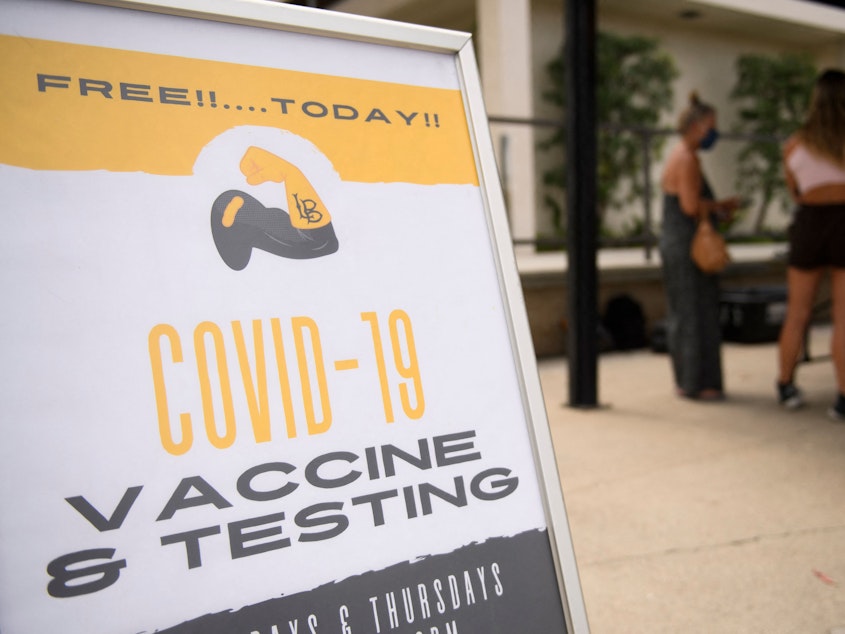Full FDA Approval Triggers More Universities To Require The COVID-19 Vaccine

It's been a week since the FDA announced full approval of Pfizer's COVID-19 vaccine, and the decision has opened the door for colleges and universities to require the vaccine for their campuses.With a new academic year underway, about 100 colleges across the country added a mandate after the FDA approval. At University of Richmond, students now have until Sept. 8 to get at least their first dose. At Central Michigan University, students can opt out of the vaccine requirement but, if they do, must submit to weekly COVID-19 testing.The University of Louisiana system will also require the vaccine for students enrolled at its nine institutions. Joseph Savoie, president of UL Lafayette, wrote to the campus community that FDA approval is "the standard for pharmaceutical safety and efficacy." The University of Minnesota instituted a vaccine requirement as well, citing FDA approval as a "key milestone in managing the pandemic."
A number of these schools had previously said they were waiting on FDA approval to announce a vaccine requirement.
"Full FDA approval gives a lot of comfort to leaders that they should go and require this, keep their community, employers, employees, faculty, staff safe," says Kristina Johnson, the president of The Ohio State University, where a vaccine mandate was announced last Tuesday.In Ohio, public schools and universities were prohibited from requiring the COVID-19 vaccine under the emergency use authorization. For Ohio State, that meant a lot of waiting: plans were in place, communications and emails were pre-written, all in anticipation for the word from the FDA to come down.
When the FDA issued full approval, Ohio State announced the mandate the next day, as the school's more than 65,000 students were welcomed back to campus. Students now need to get their first dose by Oct. 15th. If they don't meet the deadline, they'll have to take classes online. Johnson says the FDA approval "meant the world to me." Being able to require the vaccine, as COVID cases are rising in central Ohio, is a big part of her strategy for keeping the campus open and safe. "We've always looked at this through a public health lens, not a political lens," she says. "Vaccines have been around for decades and decades and decades. We know they work. We know that they keep people safe. So it's really our responsibility to get it out there."
Vaccinations on campus
Sponsored
While more than 800 colleges and universities have now adopted COVID-19 vaccination requirements for their students and staff to be able to return to campus in person, most institutions — whether or not they have a requirement — have been highly encouraging or incentivizing their students to get vaccinated.
New research on COVID safety on college campuses published in Annals of Internal Medicine finds that high vaccination rates will be the single most powerful determinant of campus safety this fall.
Colleges with campus vaccine rates above 90% can return to pre-COVID campus activities without seeing viral transmission, the research finds. That aligns with current guidance from the Centers for Disease Control and Prevention, which suggests fully vaccinated campuses can return to full capacity in-person learning, without masking or social distancing.
The CDC has also said that encouraging vaccinations is the best way to slow the spread of the virus on a college campus.
Universities — regardless of mandates — tend to have higher vaccination rates than their state's averages. Before the mandate was announced at Ohio State, about 73% of the campus community was vaccinated, says Johnson, the university president, compared with about 48% of Ohio residents. There are often places to get the vaccine on campus and positive messaging from sources that students trust.
Sponsored
"A game changer"
Rylie Martin is the assistant director of the College Crisis Initiative, an effort at Davidson College in North Carolina to collect data on COVID-19 vaccination requirements at universities. She calls the FDA approval a "game changer" for universities.
"FDA approval is kind of the thing that's going to get them across the finish line to get their student vaccination rates up," Martin explains.
It wasn't just politics holding schools back — there was uncertainty about the legality of requiring a vaccine still under emergency use authorization, despite a strong federal appellate court ruling upholding a mandate at the University of Indiana.
But FDA approval makes that legal foundation even stronger, according to Dorit Reiss, a law professor at UC Hastings College of the Law in San Francisco, who studies vaccine mandates.
Sponsored
"Vaccine mandates in the university level are, in fact, legal, and that's well in line with other cases," she says. "Challenging the university mandates is going to be very, very hard."
The pushback on the emergency status of the vaccines was the strongest argument that she's seen in her anti-vaccine research, Reiss adds, and removing that argument makes a big difference in public perception. [Copyright 2021 NPR]



